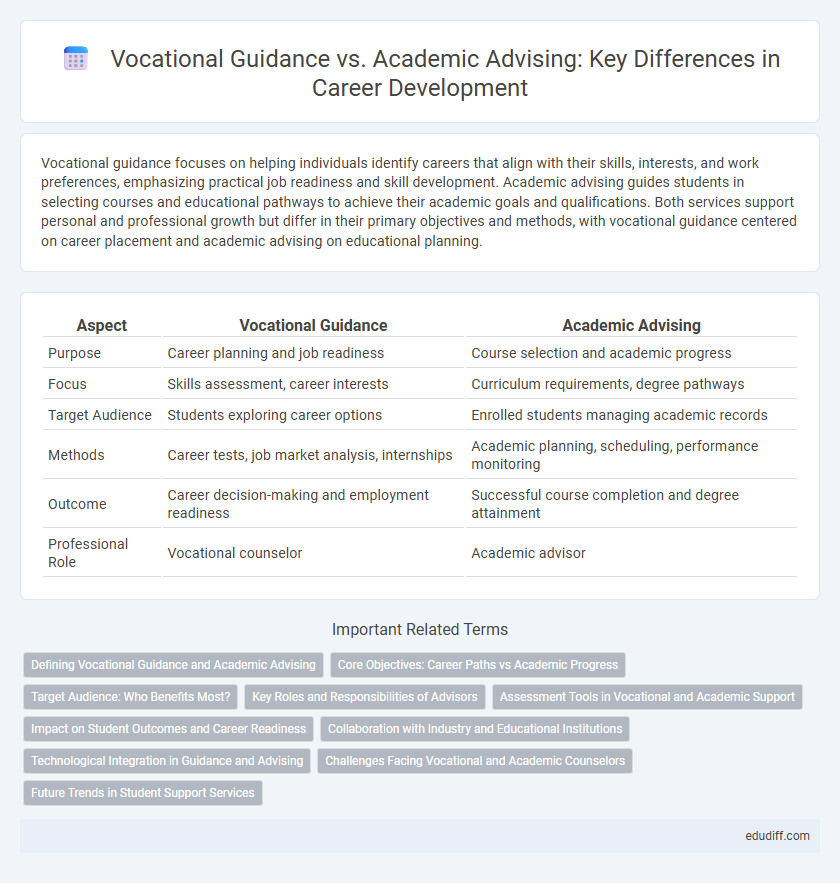Vocational guidance focuses on helping individuals identify careers that align with their skills, interests, and work preferences, emphasizing practical job readiness and skill development. Academic advising guides students in selecting courses and educational pathways to achieve their academic goals and qualifications. Both services support personal and professional growth but differ in their primary objectives and methods, with vocational guidance centered on career placement and academic advising on educational planning.
Table of Comparison
| Aspect | Vocational Guidance | Academic Advising |
|---|---|---|
| Purpose | Career planning and job readiness | Course selection and academic progress |
| Focus | Skills assessment, career interests | Curriculum requirements, degree pathways |
| Target Audience | Students exploring career options | Enrolled students managing academic records |
| Methods | Career tests, job market analysis, internships | Academic planning, scheduling, performance monitoring |
| Outcome | Career decision-making and employment readiness | Successful course completion and degree attainment |
| Professional Role | Vocational counselor | Academic advisor |
Defining Vocational Guidance and Academic Advising
Vocational guidance focuses on helping individuals identify careers that match their skills, interests, and values, emphasizing practical job readiness and workforce integration. Academic advising centers on supporting students in course selection, degree requirements, and academic success strategies tailored to their educational goals. Both services play crucial roles in student development but prioritize different outcomes--career readiness versus academic achievement.
Core Objectives: Career Paths vs Academic Progress
Vocational guidance centers on identifying suitable career paths by assessing skills, interests, and job market trends to facilitate successful employment outcomes. Academic advising focuses on ensuring students meet educational requirements, maintain satisfactory grades, and progress toward degree completion. Both services aim to support personal development but prioritize career readiness in vocational guidance and academic success in academic advising.
Target Audience: Who Benefits Most?
Vocational guidance primarily benefits individuals seeking hands-on skills and career readiness in trades, technical fields, or specific industries, including high school students, adult learners, and career changers aiming for immediate employment. Academic advising targets students pursuing post-secondary education, focusing on course selection, degree requirements, and academic success, which suits traditional college students and those planning advanced studies. Understanding the distinct needs of these audiences ensures tailored support that aligns with career goals and educational pathways.
Key Roles and Responsibilities of Advisors
Vocational guidance advisors focus on career exploration, skill assessment, and connecting individuals with job opportunities that match their interests and abilities, emphasizing hands-on training and practical experience. Academic advisors primarily assist students in course selection, degree completion requirements, and navigating institutional policies to ensure academic success. Both roles require personalized support, but vocational guidance centers on employment readiness while academic advising prioritizes educational progress.
Assessment Tools in Vocational and Academic Support
Vocational guidance utilizes assessment tools such as interest inventories, aptitude tests, and personality evaluations to match individuals with suitable career paths based on their skills and preferences. Academic advising employs diagnostic assessments, learning style inventories, and academic performance evaluations to tailor educational plans that enhance student success and retention. Both support systems leverage these tools to provide personalized recommendations that align with individual goals and potential.
Impact on Student Outcomes and Career Readiness
Vocational guidance emphasizes practical skill development and direct pathways to employment, significantly enhancing career readiness by aligning student strengths with labor market demands. Academic advising focuses on educational planning and intellectual growth, which supports long-term academic success but may lack immediate applicability to specific trades or professions. Integrating both approaches can improve student outcomes by balancing technical proficiency with foundational academic knowledge, fostering well-rounded career preparedness.
Collaboration with Industry and Educational Institutions
Vocational guidance emphasizes strong collaboration with industry partners to ensure training programs align with current workforce demands, fostering practical skill development and job readiness. Academic advising focuses on partnerships with educational institutions to support students in navigating curricula and achieving academic goals. Both approaches benefit from integrated cooperation between industries and schools, enhancing the relevance and effectiveness of career pathways.
Technological Integration in Guidance and Advising
Technological integration in vocational guidance leverages tools like AI-driven career assessment platforms and virtual reality simulations to provide personalized and immersive career exploration experiences. In contrast, academic advising increasingly adopts data analytics and online scheduling systems to streamline course selection and monitor student academic progress more effectively. Both approaches enhance decision-making processes but differ in their focus, with vocational guidance emphasizing skills alignment and job market demands, while academic advising centers on curriculum planning and degree attainment.
Challenges Facing Vocational and Academic Counselors
Vocational counselors encounter challenges such as rapidly changing labor market demands, limited resources for skill development, and addressing diverse client backgrounds with varying levels of readiness. Academic advisors face pressures from increasing student populations, evolving educational policies, and the need to balance academic planning with students' mental health concerns. Both roles require continuous professional development to navigate technological advancements and provide tailored support effectively.
Future Trends in Student Support Services
Vocational guidance increasingly incorporates artificial intelligence and data analytics to personalize career pathways, enhancing student engagement in skill-based training programs. Academic advising is evolving to integrate real-time labor market insights and digital credentialing, aligning degree options with emerging industries and workforce demands. Future student support services will prioritize hybrid models combining vocational and academic resources, fostering adaptive learning ecosystems that respond dynamically to economic shifts and individual career trajectories.
Vocational Guidance vs Academic Advising Infographic

 edudiff.com
edudiff.com